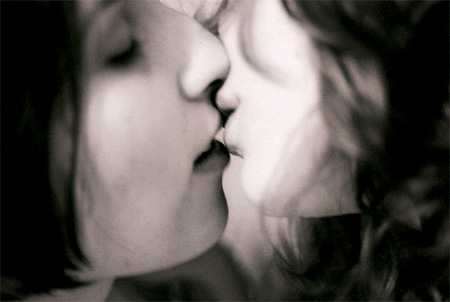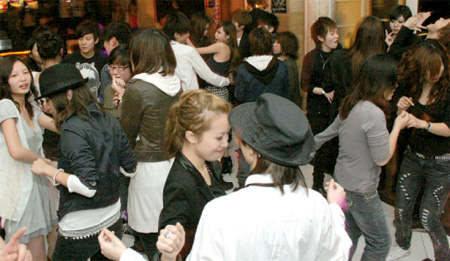Forbidden love
Updated: 2011-07-12 06:47
By Steven Chen(HK Edition)
|
|||||||||

|
Members get busy on the dance floor at a recent women-only event. Same-sex marriages among Hong Kong's LGBT community remain out of reach in a city that holds conservative views towards marriage. Provided to China Daily |
The gay community in Hong Kong is waging the same battle for the right to get married that is being waged in other cities. Here however the stakes may be considerably higher, as gay couples fight for the right for vital social services. Steven Chen reports.
When New York State Governor Andrew Cuomo signed the same-sex marriage bill into law recently, there was a wave of excitement among America's alternative lifestyle communities. Gays and lesbians flocked to New York City to tie the knot.
Here in Hong Kong their counterparts stand in envy, as activists pushing for greater rights for gays face off against powerful opposition forces. Same-sex marriage appears a distant dream.
Opponents of same-sex marriages include religious groups, academics, members of the government and the general public who hold deeply conservative views rooted in the city's colonial years. Advocates for same-sex unions are marriage-minded lesbians and gays who see themselves as disadvantaged victims missing out on the benefits of marriage. The proponents of same-sex marriage are supported in their cause by human rights groups and some academics.
But the road to an ultimate resolution is rocky, with the biggest hurdle being that each side argues its case from a different starting point. In the end it may all boil down to the question: What is marriage?
"Marriage", says Sam Winter, "is a type of social contract which performs many functions. It allows two individuals to make a lifelong commitment to each other, and more importantly, it is a declaration to society of their partnership and their love. It's also a way of protecting their mutual interests, including financial, and offers them certain benefits."
|
Members chat over drinks at a recent women-only event. Provided to China Daily |
Depending on where the couple is living, these benefits may include tax breaks, the right to bequeath money and other assets to the other if one passes away and clear structures to determine access in the event of divorce, if there are any children involved.
In high-priced Hong Kong, where low incomes and sky-high property prices force nearly half the population into government-subsidized accommodation, the key benefit is access to public housing, since the wait for single applicants can be up to three times longer than for couples, who can wait an average of 3-5 years before being allocated.
Another is legal protection and recourse in the event of abuse - a dark side to same-sex partnerships that rarely makes headlines.
Currently there are no laws covering spousal abuse by one person against a same-sex partner, says Tommy Chan, founder and lead spokesman for the gay rights group Rainbow Hong Kong.
"The issue of same-sex marriage is one of human rights", says Winter, a professor of gender studies who teaches sexuality and gender diversity at Hong Kong University. "The institution of marriage in Hong Kong is a right protected under a variety of frameworks including the international declaration of human rights, the city's Basic Law and specific government ordinances.
"Everyone in Hong Kong should have the right to equal treatment. This includes access to the rights available within a marriage."
Any changes to laws to allow marriages between consenting adults would probably occur as a series of smaller victories, says Michael Vidler, a human rights lawyer who fights for the rights of sexual minorities. Like Winter, Vidler believes marriage between same-sex couples is a fundamental right, the granting of which would also bring economic benefits to the city in terms of broadening its attractiveness to gay professionals, he says.
Vidler sided with gay rights activist, Billy Leung, during Leung's successful effort to change the legal age of consent between homosexual couples in 2004, and is currently involved in the high-profile case of local transsexual "W", who is fighting for the right to marry her male partner.
"The Billy Leung case was won on the grounds that relations between consenting adults of the same sex should be afforded the same rights as heterosexual couples.
"I can imagine that any changes to laws barring same-sex marriage would be carried out in a similar way - challenges to laws barring freedoms or rights that would normally be given in a marriage, but are denied because the union is not recognized.
"It may be on the grounds of denial of tax benefits, housing or other benefits (now) given to married heterosexual couples."
Marriage in Hong Kong is bound by the Marriage Ordinance of 1970, in which marriage is recognized as the union between a man and a woman. It was this law to which the government turned when arguing against allowing "W" to marry. The same law would likely be cited as grounds to refuse same-sex marriages as well.
Opponents of the law would likely turn to Article 37 of the Basic Law, which gives every person the right to marry. There are also international human rights covenants, to which Hong Kong is a signatory, says Vidler.
While academics, lawyers and the government are clear on which side of the issue they fall, feelings within the LGBT (lesbian, gay, bisexual, and transgender) community are mixed.
"We ask ourselves, do we need marriage?" says Rainbow's Chan. "Some say yes, but many say no."
"Many of my friends think marriage is an attempt to copy the heterosexual lifestyle. If we get married, aren't we conforming to what straight people think love is?
"The more urgent matters are public housing for us and our partners and protections in the case of abuse," he says, seemingly unconcerned that marriage and such rights might actually be intertwined.
Someone who would like nothing more than to get married is Kidd Fu, founder of local girl-to-girl community group Girlicious.
"I've been with my partner for five years. We met when we were studying at the same college when we were 15. Her parents said they would force her out of her house because we were together, so she ran away to live with me.
Housing is a problem because it's expensive. My parents are more open-minded but we need a place (of our own) to stay. Finally, she moved back home, because they asked her to come back, but they still hate me even now. I love my partner very much. I want to get married and hope we can stay together."
For Ben Chan, marriage is a basic protection that everyone should enjoy. The merchandising assistant who says he is now looking for true love after a string of short-term relationships also says to grow up gay in Hong Kong is to be on guard, always, and avoiding behavior that would arouse suspicion.
"It's not easy for same-sex couples to have privacy. We can't do any 'close actions' in public. Everything has to run under the surface. We need our own space.
"If Hong Kong allowed same-sex marriages, we could enjoy the same financial and housing benefits. And I feel the society might accept us more."
If marriage were an institution created for one couple only, things might be easier, says Professor Kwan Kai-man, an associate professor who teaches philosophy at Baptist University and is founder of the Hong Kong Sex Culture Society.
But it isn't, he insists.
"Marriage is more than just a union between two people. It's a social institution set up to encourage certain virtues and lifestyles which contribute to the common good of society. Same-sex marriage is not simply a matter of equal rights."
Kwan does not share the view of religious-based groups like the Society for Truth and Light. The society decries same-sex marriage as an affront to virtuous living, holding that life should be lived in accordance with Christian teachings. Kwan opposes same-sex marriage on ground that such unions will open the door to all kinds of arrangements, many of which, he believes, are not healthy.
"I do not support same-sex marriages because I've yet to see a convincing argument for it," says Kwan.
"If supporters argue that the union of a man and woman is a marriage and the union of two persons is marriage, how do we argue against heterosexual males A and B, living together as friends who want to marry for tax advantages? We would have two homosexuals, C and D, who can marry but A and B who can't. Or how can we argue against a bisexual man marrying one man and one woman because he loves them equally?
"In Holland, in 2005, a man and two women signed a cohabitation contract akin to partnership or marriage. While prominent Dutch liberal Jans Martens agreed that this triple union was a kind of polygamy, he also said he wasn't concerned how many husbands or wives were involved in a marriage.
"Yet many scholars argue that monogamy is the best system for bearing and rearing children. As for international covenants on human rights, both the Declaration of Human Rights and the International Covenant on Civil and Political Rights refer to marriage rights but do not include same-sex partnerships."
And, he insists, the problems the gay community have regarding other rights can be solved without a radical change to the institution of marriage.
"Inheritance can be safeguarded by a will; (decisions concerning) hospital (treatment) can be made more flexible in accordance with the wishes of the patient.
"The idea of marriage cannot be indefinitely expanded. Liberals tend to be scornful of the conservative argument against changing marriage, yet how do we stop sliding down that slippery slope once (such) rights and liberties are granted?"
Epic issues like human rights declarations and the future of society don't figure much in the conversations of Fu and her partner as they dream of the day they can marry and live in a place of their own.
"If you met me and didn't know who I was, you would think I'm a good person. But when you find out I'm a lesbian then suddenly I become a bad person? We are (still) the same people. Lesbians and gays are also human beings. We should have our rights."
(HK Edition 07/12/2011 page4)

